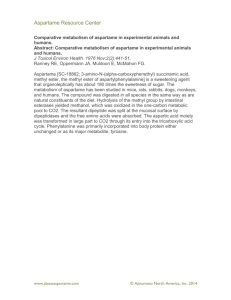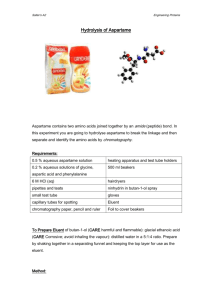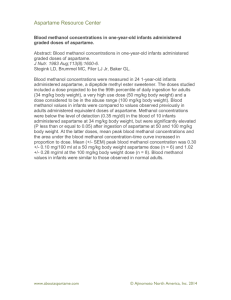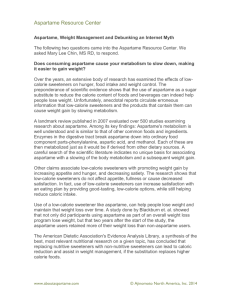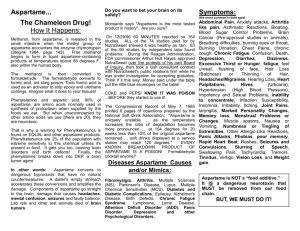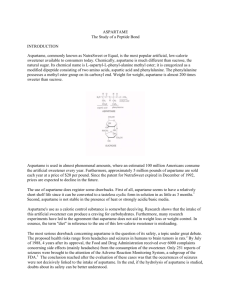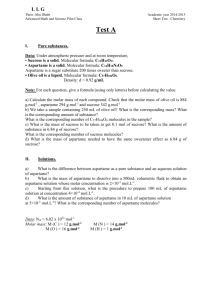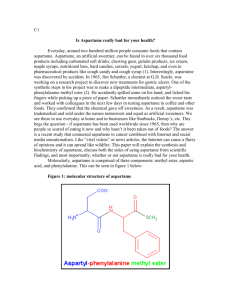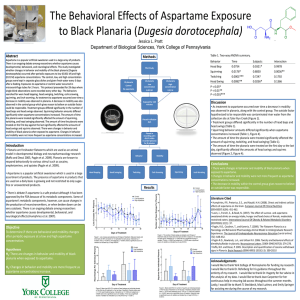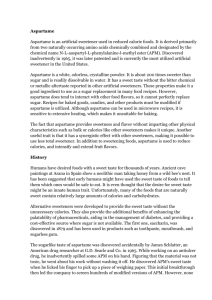File - Krystal Kares Health Watch
advertisement
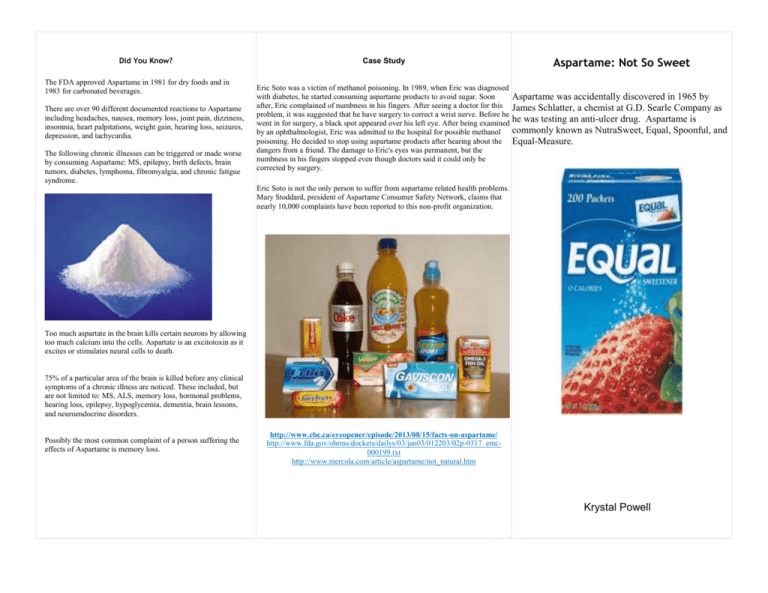
Did You Know? The FDA approved Aspartame in 1981 for dry foods and in 1983 for carbonated beverages. There are over 90 different documented reactions to Aspartame including headaches, nausea, memory loss, joint pain, dizziness, insomnia, heart palpitations, weight gain, hearing loss, seizures, depression, and tachycardia. The following chronic illnesses can be triggered or made worse by consuming Aspartame: MS, epilepsy, birth defects, brain tumors, diabetes, lymphoma, fibromyalgia, and chronic fatigue syndrome. Case Study Eric Soto was a victim of methanol poisoning. In 1989, when Eric was diagnosed with diabetes, he started consuming aspartame products to avoid sugar. Soon after, Eric complained of numbness in his fingers. After seeing a doctor for this problem, it was suggested that he have surgery to correct a wrist nerve. Before he went in for surgery, a black spot appeared over his left eye. After being examined by an ophthalmologist, Eric was admitted to the hospital for possible methanol poisoning. He decided to stop using aspartame products after hearing about the dangers from a friend. The damage to Eric's eyes was permanent, but the numbness in his fingers stopped even though doctors said it could only be corrected by surgery. Aspartame: Not So Sweet Aspartame was accidentally discovered in 1965 by James Schlatter, a chemist at G.D. Searle Company as he was testing an anti-ulcer drug. Aspartame is commonly known as NutraSweet, Equal, Spoonful, and Equal-Measure. Eric Soto is not the only person to suffer from aspartame related health problems. Mary Stoddard, president of Aspartame Consumer Safety Network, claims that nearly 10,000 complaints have been reported to this non-profit organization. Too much aspartate in the brain kills certain neurons by allowing too much calcium into the cells. Aspartate is an excitotoxin as it excites or stimulates neural cells to death. 75% of a particular area of the brain is killed before any clinical symptoms of a chronic illness are noticed. These included, but are not limited to: MS, ALS, memory loss, hormonal problems, hearing loss, epilepsy, hypoglycemia, dementia, brain lessons, and neuroendocrine disorders. Possibly the most common complaint of a person suffering the effects of Aspartame is memory loss. http://www.cbc.ca/eyeopener/episode/2013/08/15/facts-on-aspartame/ http://www.fda.gov/ohrms/dockets/dailys/03/jan03/012203/02p-0317_emc000199.txt http://www.mercola.com/article/aspartame/not_natural.htm Krystal Powell Shortened List of Side Effects Eye: Decreased vision and/or other eye problems 25% Blindness (one or both eyes) 3% Ear: Tinnitus ("ringing," "buzzing")13% Severe intolerance for noise 9% Marked impairment of hearing 5% Neurologic: Headaches 45% Dizziness, unsteadiness, or both 39% Confusion, memory loss, or both 29% Severe drowsiness and sleepiness 17% Paresthesia ("pins and needles," "tingling")15% Convulsions (grand mal epileptic attacks)15% Petit mal attacks and "absences" 13% Severe slurring of speech 12% Severe tremors 9% Severe "hyperactivity" and "restless legs" 8% Atypical facial pain 7% Long Term Consumption pf Aspartame Chronic illnesses which may be caused or worsened by the chronic, long-term ingestion of aspartame Brain tumors Multiple sclerosis Epilepsy Chronic fatigue syndrome Parkinson's Disease Alzheimer's Mental retardation Lymphoma Birth defects Fibromyalgia Diabetes Arthritis (including Rheumatoid) Chemical Sensitivities Attention Deficit Disorder Psychologic-Psychiatric: Severe depression 25% Extreme irritability" 23% "Severe anixiety attacks" 19% Marked personality changes" 16% Recent "severe insomnia" 14% "Severe aggravation of phobias" 7% Other: Frequency of voiding, burning urination (dysuria), or both 13% Severe joint pains 11% Fluid retention and leg swelling 4% Phenylalanine (50 percent) Aspartic acid (40 percent) Methanol (10 percent) Avoid aspartame products during pregnancy. Increases levels of phenylalanine may interfere with the growth of the fetus brain. Aspartic acid (aspartame) and glutamate (ingredient in monosodium glutamate) have been labeled as excitotoxins, a group of excitatory amino acids that can cause sensitive neurons to die. Gastrointestinal: Nausea 14% Diarrhea 13% Blood in the stools 12% Pain on swallowing 5% Endocrine and Metabolic: Problems with diabetes: loss of control 11% Menstrual changes 6% Marked thinning or loss of the hair 6% Aspartame's three components: When aspartame is exposed to heat or prolonged storage, it breaks down into metabolites. One of these is Diketopiperazine, a toxic metabolite. This is why cooking with Aspartame is not recommended. Chest: Palpitations, tachycardia (rapid heart action)16% "Shortness of breath" 10% Recent hypertension (high blood pressure)6% Skin and Allergies: Severe itching without a rash 8% Severe lip and mouth reactions 5% Aggravation of respiratory allergies 2% Aspartame: Ingredients The last component of aspartame is methanol, better known as wood alcohol, a deadly poison. Food and beverages containing phenylalanine, the major ingredient in aspartame, must be labeled due to the genetic disorder, phenylketonuria (PKU). The U.S. carries a warning on all aspartame products to alert people with PKU. People with this genetic disorder lack the enzyme needed to metabolize phenylalanine and therefore it accumulates in the body and can "cause severe mental retardation". There are an estimated 10 million people who are carriers and may not know it. A typical liter of an aspartame diet soda contains approximately 55 milligrams of methanol. Complications of methanol poisoning include blindness, brain swelling, pancreatitis, numbness, shooting pains, cardiac changes, and death. When ingested, methanol breaks down into formaldehyde, known to cause cancer, accumulating slowly without detection in the body. The most common use for formaldehyde is embalming the dead in many cultures to prepare for burial.
